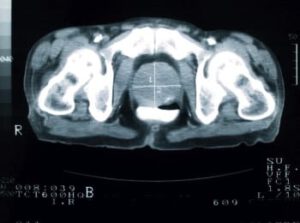 This MRI of a man’s pelvis shows that his prostate is enlarged to almost three times the regular size, which may be a sign of cancer. The prostate is marked by a cross.
This MRI of a man’s pelvis shows that his prostate is enlarged to almost three times the regular size, which may be a sign of cancer. The prostate is marked by a cross.
Prostate cancer, the most common cancer to affect men, kills 30,000 men of all ethnicities each year.
The disease is known to have a strong genetic component, and several common DNA variations have been found to affect a man’s risk of prostate cancer. However, previous research has analyzed men of only European and African ancestry, leaving the effects of these genetic variants in Asian men undetermined.
New Research
Recently, researchers analyzed Japanese men for several genetic variants previously linked to prostate cancer in European and African American populations. The study found that some of these variants also affect the risk of developing prostate cancer in Asian men.
A team from Boston and Japan led by Matthew Freedman searched for risk variants by scanning the genomes of nearly 1,350 Japanese men, including more than 300 prostate cancer patients. The results, published online last week in the Journal of the National Cancer Institute, provide evidence that five out of 23 SNPs previously associated with prostate cancer among Europeans and African Americans also impact risk in this Asian population.
Although not every one of the five SNPs had a statistically significant association on its own, the group of SNPs had an association with prostate cancer. Men who carry six or more of the 10 possible risk copies at any of the five associated SNPs (people have two copies of each SNP) had 6.22 times increased odds of developing prostate cancer than men with two or fewer risk copies. The SNPs were not linked to the progression of prostate cancer, but SNPs were associated with a younger age at diagnosis.
More Research Needed
Further research with a larger number of patients will be needed to determine how several of these SNPs may have differing effects between populations of different ancestry, suggests John Ioannidis in an accompanying editorial published in the Journal of the National Cancer Institute.
“When each SNP is analyzed separately, there are clear signs of divergent risks in Asian versus European populations,” Ioannidis wrote. Several other SNPs may also have considerably different effects in these and African American populations, so more research is needed to accurately determine an individual’s risk for prostate cancer.